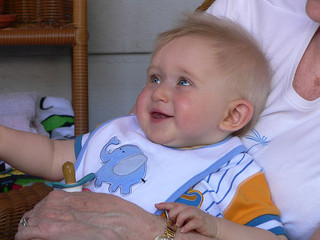February 21, 2013 – Last week, President Barack Obama called for increased investment in universal early childhood education – a proposition that, despite being backed by mountains of research on the brain development of children remains a political hot potato.
Neuroscience research shows that the first three years of a child's life are critical in brain development and that poor nutrition or adverse experiences during these years can permanently affect health and educational outcomes.
But what interventions are appropriate and feasible for addressing the needs of families with such young children – how does one make the case for funding and implementing such interventions?
“The thing about prevention is that it doesn't really look like health,” said Swati Adarkar, president and CEO of the Children's Institute, a statewide organization that focuses on investing in early childhood education, adding that typically funding streams don't appear until there's a demonstrated problem.
This week, Robin Doussard – who for the last seven years has been editor of Oregon Business magazine, and earlier held newspaper jobs all over the country – stepped into the role of director of communications for the Institute. The move was driven partly by a belief in the institute's work and a belief in the effectiveness of early childhood interventions, and also by Doussard's personal experience as one of six children in a family that sometimes worked and sometimes did not.
“We were those siblings who needed help. We got it sometimes and didn't get it sometimes,” Doussard said. The first member of her family to go to college, Doussard has won the Robert F. Kennedy Award for coverage of disadvantaged children, a Casey Medal and received Pulitzer recognition.
“So many families are one step away from collapse,” Doussard said. While some research suggests that increased investment in early childhood intervention will not only save costs – in the corrections and health systems – children who receive appropriate interventions early on tend to earn more money as adults and make more contributions to the economy.
In the hope of getting good results that can be replicated elsewhere, the Institute has created the Early Works Initiative, which – in partnership with educational institutions and government agencies – has created two pilot preschools – one in rural Yoncalla and one in Portland's David Douglas School District – to start working with at-risk children earlier in their lives.
Both pre-schools have hired a parent-community engagement coordinator who in some cases is the first contact between parents and the educational community.
One problem that's been immediately addressed is attendance. Often, parents don't see preschool or kindergarten as important years for learning, and will sometimes keep children home for relatively minor physical complaints. The parent-community engagement coordinator acts as an advice nurse, talking to parents about what ailments merit a day home from school and which ones don't.
In addition, she sometimes talks to parents about the other implications of children's complaints – for instance, stomach pain can often be a sign of stress and anxiety, so she will ask what's going on that might be causing the secondary problem. Now the pre-school boasts a 98 percent attendance rate, far higher than the rest of the school district.
“Health has gotten so much attention because everybody has a health issue,” Doussard said. “It's really not in the health or the education space.”
“That's why we do the demonstration – to make the invisible visible,” Adarkar said.
Besides starting these pilot projects, the institute advocates for early childhood education statewide, and works with other advocacy organizations to consider the research and decide which policies to advocate for – generally
The policy prescription for children ages zero to three hasn't been written yet, but researchers and policymakers are likely to keep their eye on the issue, Adarkar said.
Doussard said another wrinkle in getting appropriate funding is that often, those involved in early childhood education compete for funding – but she's optimistic that the combination of a president, a national secretary of education and a governor who support early childhood education, funding for proven interventions might finally come into play.
“Hopefully, the timing is right to do something substantial around this issue,” Doussard said.